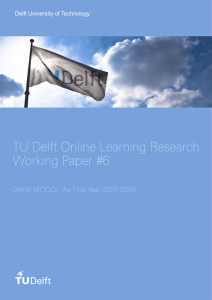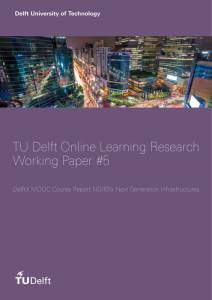Posts tagged Hennis
EDM2015: Modeling Learners’ Social Centrality and Performance through Language and Discourse
This paper is presented at the Educational Data Mining Conference 2015 in Madrid, Spain.
Abstract
There is an emerging trend in higher education for the adoption of massive open online courses (MOOCs). However, despite this interest in learning at scale, there has been limited work investigating the impact MOOCs can play on student learning. In this study, we adopt a novel approach, using language and discourse as a tool to explore its association with two established measures of learning: traditional academic performance and social centrality. We demonstrate how characteristics of language diagnostically reveal the performance and social position of learners as they interact in a MOOC. We use Coh-Metrix, a theoretically grounded, computational linguistic modeling tool, to explore students’ forum postings across five potent discourse dimensions. Using a Social Network Analysis (SNA) methodology, we determine learners’ social centrality. Linear mixed-effect modeling is used for all other analyses to control for individual learner and text characteristics. The results indicate that learners performed significantly better when they engaged in more expository style discourse, with surface and deep level cohesive integration, abstract language, and simple syntactic structures. However, measures of social centrality revealed a different picture. Learners garnered a more significant and central position in their social network when they engaged with more narrative style discourse with less overlap between words and ideas, simpler syntactic structures and abstract words. Implications for further research and practice are discussed regarding the misalignment between these two learning-related outcomes.
Paper
SEFI2015: Gender and Diversity in Engineering MOOCs, a first Appraisal
This paper was presented at the 43rd Annual SEFI Conference June 29 – July 2, 2015 in Orléans, France
Abstract
This paper addresses the participation and performance of MOOC students in relation to gender and diversity. It is a first appraisal based on the data collected from the five engineering MOOCs executed in 2013-2014 at the Delft University of Technology (TUD) on the edX platform, which is part of the edX consortium (www.edx.org). section 2 gives an overview about previous research outcomes. In section 3 the data collection from TUD is summarized under the special focus on gender and diversity. In section 4 the authors of this paper present the outcomes of the data analysis with a focus on gender and diversity of student population in relation to participation and performance. Section 5 summarizes the outcomes and gives an outlook to further educational and research questions in this field.
Paper
SEFI2015: The Value of Engineering MOOCs from a Learner’s Perspective
This paper was presented at the 43rd Annual SEFI Conference June 29 – July 2, 2015 in Orléans, France
Abstract
This paper looks at the perceived value students adhere to the DelftX MOOC engineering courses they have taken, in other words what is the course worth in the context of their learning needs? Are you doing the course because you are curious, you want to get more knowledgeable on the topic, you need to know something related to your work, you do it for other professional reasons. This research will not cover all arguments as it is a first endeavor to get to know the learner better from the value perspective.
Paper
IJCLEE2015: Who is the Learner in the DelftX Engineering MOOCs?
This paper was presented at International Joint Conference on the Learner in Engineering Education (IJCLEE 2015) in San Sebastian.
Abstract
The Delft University of Technology (TUD) deployed her first generation of massive open online courses (MOOCs) in 2013-2014 delivered through the edX platform. These DelftX MOOCs were engineering courses designed at the level equivalent to that of a bachelor-program entry level. Almost 140 thousand students registered, around 3,7% received certificates of completion, and the rest participated to a degree reflective of their needs. To better understand and ultimately enhance the MOOCs, TUD conducted the collection and analysis of data about learners and their contexts. This exploratory paper focuses on the specific analyses pertinent to describing the demographics of an Engineering MOOC participant, as observed in the first generation of TUD MOOCs. The implications of the observed participant demographics are analysed and discussed.
Paper
Working Paper 4: Introduction to Credit Risk Management 2014
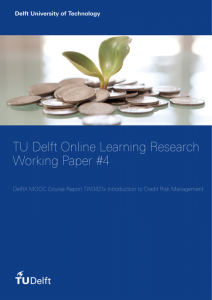 This report is to give more insight in the background, the implementation of the course and the results. The purpose is to provide useful information (and clean data) to the team of developers and teachers and to others to support their aspiration to improve online education. A comparative analysis of the first five DelftX MOOCs can be found in the ‘Working Paper DelftX MOOCs, the first year (2013-2014)’.
This report is to give more insight in the background, the implementation of the course and the results. The purpose is to provide useful information (and clean data) to the team of developers and teachers and to others to support their aspiration to improve online education. A comparative analysis of the first five DelftX MOOCs can be found in the ‘Working Paper DelftX MOOCs, the first year (2013-2014)’.
Working Paper 3: Introduction to Aeronautical Engineering 2014
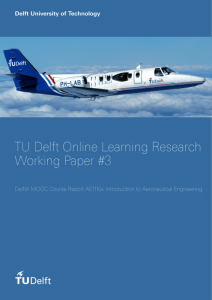 This report is to give more insight in the background, the implementation of the course and the results. The purpose is to provide useful information (and clean data) to the team of developers and teachers and to others to support their aspiration to improve online education. A comparative analysis of the first five DelftX MOOCs can be found in the ‘Working Paper DelftX MOOCs, the first year (2013-2014)’. Continue reading
This report is to give more insight in the background, the implementation of the course and the results. The purpose is to provide useful information (and clean data) to the team of developers and teachers and to others to support their aspiration to improve online education. A comparative analysis of the first five DelftX MOOCs can be found in the ‘Working Paper DelftX MOOCs, the first year (2013-2014)’. Continue reading
Working Paper 2: Introduction to Water Treatment 2013
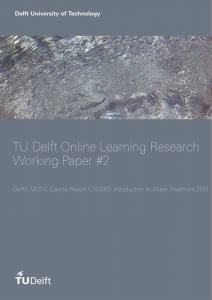 This report is to give more insight in the background, the implementation of the course and the results. The purpose is to provide useful information (and clean data) to the team of developers and teachers and to others to support their aspiration to improve online education. A comparative analysis of the first five DelftX MOOCs can be found in the ‘Working Paper DelftX MOOCs, the first year (2013-2014)’. Continue reading
This report is to give more insight in the background, the implementation of the course and the results. The purpose is to provide useful information (and clean data) to the team of developers and teachers and to others to support their aspiration to improve online education. A comparative analysis of the first five DelftX MOOCs can be found in the ‘Working Paper DelftX MOOCs, the first year (2013-2014)’. Continue reading
Working Paper 1: Solar Energy 2013
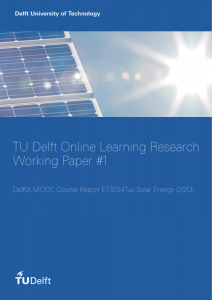 This report is to give more insight in the background, the implementation of the course and the results. The purpose is to provide useful information (and clean data) to the team of developers and teachers and to others to support their aspiration to improve online education. A comparative analysis of the first five DelftX MOOCs can be found in the ‘Working Paper DelftX MOOCs, the first year (2013-2014)’. Continue reading
This report is to give more insight in the background, the implementation of the course and the results. The purpose is to provide useful information (and clean data) to the team of developers and teachers and to others to support their aspiration to improve online education. A comparative analysis of the first five DelftX MOOCs can be found in the ‘Working Paper DelftX MOOCs, the first year (2013-2014)’. Continue reading

